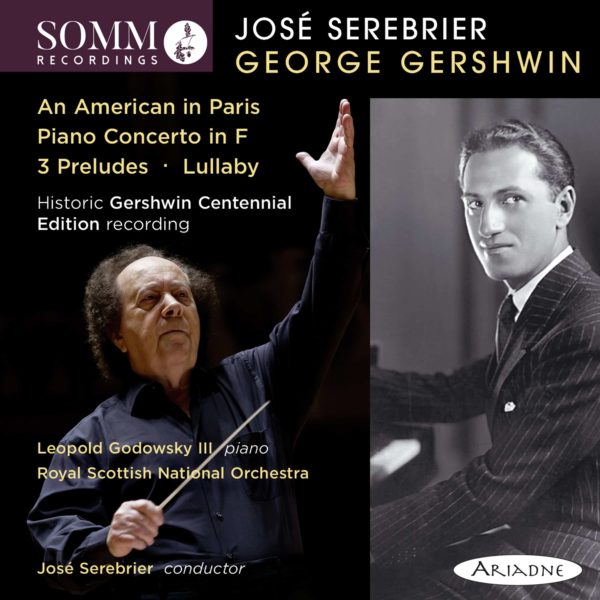Congratulations to José Serebrier on his 80th birthday ! He's a conductor who occupies a unique place, mentored by Leopold Stokowski and George Szell, always independent and open-minded. Please read more about him in this article here. A most interesting personality! So let's celebrate with this historic Gershwin Centenary Edition recording from SOMM where Serebrier conducts the Royal Scottish National Orchestra in Gershwin's An American in Paris, Three preludes and Concerto in F for Piano and Orchestra, featuring Leopold Godowsky III, Gershwin's nephew.
The public image of George Gershwin these days is coloured by his sucesss on Broadway and the use of his music in Hollywood, but in the 1920's Gershwin was part of the avant garde. The premiere of Rhapsody in Blue in February 1924 was attended by Stokowski, Rachmaninoff, Fritz Kreisler and Walter Damrosch, who was keen enough to offer Gershwin a commisson which resulted in the Piano Concerto in F, with Gershwin himself as soloist, in Carnegie Hall in December 1925. Gershwin was a true original, one of the first to appreciate jazz as serious music, incoporating the sounds of modern, urban America for the concert hall. George Antheil's Ballet méchanique (1926) was then known only in Paris. Edgard Varèse's Amériques (1921) and Hyperprism (1922/3) were pioneering works, way ahead of their time. Significantly, both were premiered by Stokowski in 1926, 1924 respectively, followed by Arcana in 1927, all this long before Copland and Bernstein. It is in that context that Gershwin's place in modern music is now being re-assessed. Please read more here about the University of Michigan Gershwin Initiative and the on-going new critical edition of his opus. .
Serebrier's interest in Gershwin and in American music goes back to his childhood. At the age of fourteen, he organized a concert of fellow music students, attended by the then President of Uruguay, a high profile event, covered in the newspapers at the time. Sereberier conducted Gershwin, Edgard Varèse and Charles Ruggles who even now are "new music". Too young to have formed preconceptions, the young players were carried away by Serebrier's enthusiasm. That freshness has rarely dimmed, as these performances indicate. Serebrier's Gershwin descends from "source" to speak, from an original approach to the scores themselves, not from the popular image. Thus this vivid interpretation of An American in Paris which captures the excitement Gershwin felt when he discovered Paris when it was the cutting edge centre of innovation. The introduction swaggers with the confidence of a young man on an adventure. Brashness gives way to galumphs (bassoons, tuba, trombones) the walking pace leaping with joy. In the second section a tentaive mood is soon brushed away by the exuberant theme led by different saxophones : a fanfare for the New World, the instrument itself invented a few decades before. The famous "Blues" motif curls sensuously, the strings around it expansive. Homesickness doesn't last long though: Paris has absorbed jazz on its own terms. Thus the sassy trumpets and saxophones, and the playful syncopation. When the "walking" theme returns, it is underlined by percussion. An animated final section, with crashing cymbals, and taxi horns (employed earlier by Varèse) and a bittersweet conclusion. The new edition of the score, premiered recently, is sharper, but on this recording, made in 1998, Serebrier gives the standard edition a very fine reading.
Gershwin's Piano Concerto in F is, in comparison, more conventional, though the distinctively Gershwinesque strings give it character. Serebrier brings out the spikey tension in the introduction, which is answered by the piano, (Leopold Godowski III) developing a smoother line. The second movemnent is a nocturne that grows more intense as it proceeds. Serebrier shapes the finale, marked molto agitato - con brio. so it seems to burst with suppressed energy. Alexander Glazunov was present at the premiere, in December 1928, Damrosch having sensed a Russian context to the concerto. But it is woth noting that Serebrier is one of the finest Glazunov conductors, and has recorded the complete symphonies with this orchestra, the Royal Scottish National, and with the Russian National Orchestra.
Gershwin's Three Preludes were originally planned as an extended series of piano pieces, of which only three were published. On this recording, we hear Serebrier's transcription for orchestra. The piano still dominates, the orchestra extending and enhancing the line. Serebrier is also a composer, whose first symphony impressed Stokowski so much that the older conductor invited the younger to join him as an Associate with the American Symphony Orchestra. Although Gershwin's Lullaby, written when he was only 20 for a Broadway comedy, is little known. Serebrier orchestrated it at the request of Leopold Godowsky III. The new orchestration respects the repeated phrases, colouring them without overpowering what is effectively a miniature. It is included in this recording becaause it reflects the lullaby in the second Prelude.


